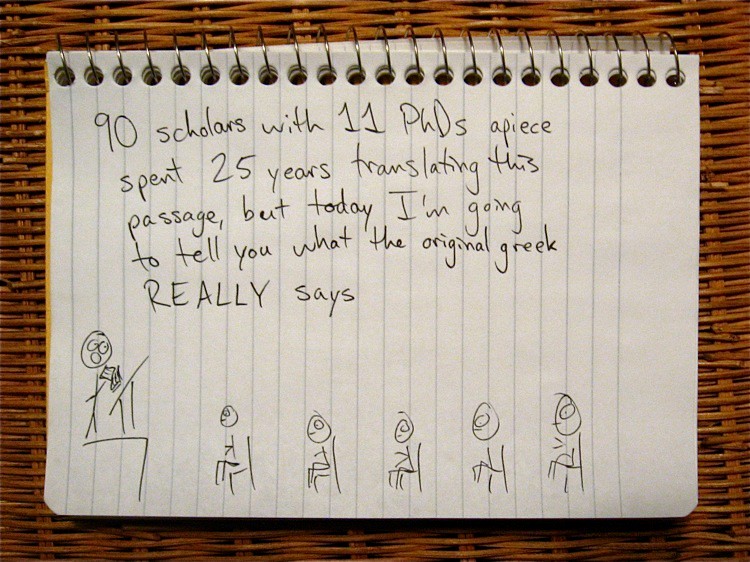When some people discuss English Bible translations, they mainly argue about which is the best and why others are inferior.
Here’s what to do instead—six suggestions.
1. Regularly benefit from the strengths of multiple translations.
Don’t view English Bible translations as a competition. Good Bible translations are incredibly helpful resources, and English readers should benefit from more than one of them. It’s both-and, not either-or.
There’s so much we can benefit from by reading multiple English Bible translations along the spectrum that spans from more form-based translations to more meaning-based ones.

2. Don’t overestimate your ability to translate the Bible into English.
A story from linguist and New Testament scholar Moisés Silva illustrates this principle. Silva’s mother tongue is Spanish, and when he was a student, one of his professors asked him whether he’d translate a Spanish theological article into English for him. Silva thought that he could do this quickly without a problem, but it ended up being a nightmare. He hadn’t translated much written material from Spanish to English before, and he quickly realized that an English translation simply can’t convey all the connotations of the Spanish original.
This experience got Silva thinking: Why did he struggle so much to translate from Spanish to English when he didn’t struggle to nearly the same degree when he translated from Greek to English or Hebrew to English? He had known Spanish since infancy, but he’d known Greek and Hebrew for only a few years. Yet he felt far more confident translating Greek and Hebrew. Why? Silva identifies two reasons:
(1) Because he was a native Spanish speaker, he understood subtleties and connotations in Spanish that he simply couldn’t know in Greek or Hebrew. So while he understood how poor his Spanish-to-English translation was, he didn’t understand how poor his Greek-to-English translation was.
(2) Colleges and graduate schools tend to emphasize translating Greek to English in an extremely form-based way. That’s not bad. It’s like learning to ride a bike with training wheels. But the problem is that some students get the idea that riding a bike with training wheels is the goal. Translating Greek into stilted, barely intelligible English is not the goal.
3. Thank God for good Bible translators and translations.
It’s fine for you to think that a particular English translation is optimal overall for English speakers worldwide. But at the same time, you should respect the other major translation philosophies and benefit immensely from other translations. One test of your attitude is this: Can you genuinely thank God for good Bible translators and translations—even translations you don’t think are optimal overall?
Bible translation is complex, and high-quality translation requires a massive amount of training and skill and experience. So why wouldn’t we thank God for gifting us with scholars who devote their lives to that so well?
4. Be careful when you criticize a translation.
This comic makes me chuckle:

When you think about it that way, it really does make you think, Hmmm, have I been a little too quick to criticize Bible translations?
There’s a place to critique translations—all of them, because none is perfect. But my point here is to ask, “Do you think you should be a little more cautious and humble when you critique a Bible translation?” Bible translation is so incredibly complicated. It’s a give-and-take process. Committee members often disagree with each other on how to translate a certain passage, so some people lose the vote. Not every translation decision is clear-cut. Sometimes it’s a toss-up when you weigh the pros and cons for the top two or three best options.
When evaluating a translation, try being judicious: “Another way to translate this text is . . . ” or “I think a better way to render this is . . . ” or “One nuance this translation doesn’t capture is . . . ”
5. Recognize your monolingual bias (if you have one).
Dave Brunn spent more than 20 years in Papua New Guinea serving the Lamogai people through church planting, literacy training, and Bible translation and consultation. He translated the entire New Testament into the Lamogai language. And the most distinctive contribution his book One Bible, Many Versions makes to the English Bible controversy is what he emphasizes in chapter seven: “God speaks in languages other than English.”
If you have a monolingual bias (especially if you know only Indo-European languages such as English), then factor that in as you think through Bible-translation philosophies. Why? Because you simply can’t translate the Bible into some non-Indo-European languages with a form-based translation philosophy.
6. Recognize how similar English Bible translations are.
Rather than focus on how translations such as the NASB, ESV, NIV, and NLT are different, recognize that they share a lot in common. Yes, there is a spectrum of differences, but the translations are more similar than you might realize. Dave Brunn suggests that they’re similar in at least 26 ways. Here are four:
- Every version translates thought for thought rather than word for word in many contexts.
- Every version gives priority to meaning over form.
- Every version steps away from the original form in order to be grammatically correct in English.
- Every version sometimes gives priority to naturalness and appropriateness over the ideal of seeking to be transparent to the original text.
So those are my six suggestions. I think it’d be far more edifying to do them instead of arguing about which English Bible translation is the best.
And most important is what suggestion #1 implies. In order to regularly benefit from the strengths of multiple translations, you must read the Book.
Editors’ note: This is a condensed excerpt from the chapter on Bible translation in Andy Naselli’s How to Understand and Apply the New Testament: Twelve Steps from Exegesis to Theology (P&R, 2017).
Try Before You Buy: FREE Sample of TGC’s New Advent Devotional
 Choosing the right Advent daily devotional can be tough when there are so many options. We want to make it easier for you by giving you a FREE sample of TGC’s brand-new Advent devotional today.
Choosing the right Advent daily devotional can be tough when there are so many options. We want to make it easier for you by giving you a FREE sample of TGC’s brand-new Advent devotional today.
Unto Us is designed to help you ponder the many meanings of this season. Written by TGC staff, it offers daily Scripture readings, reflections, and questions to ponder. We’ll send you a free sample of the first five days so you can try it out before purchasing it for yourself or your church.
































